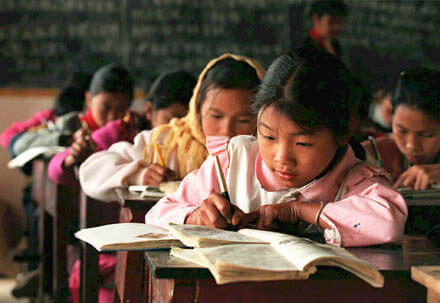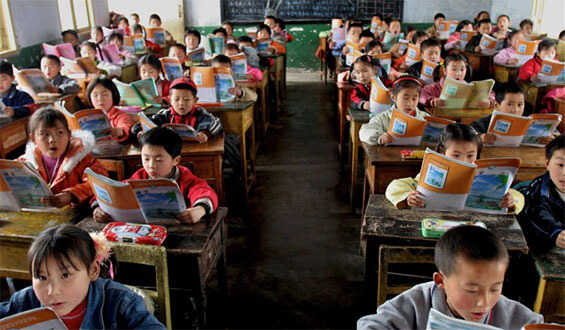The education system in China is very different from the U.S. education system. China has the largest education system in the world. The most important component of the education system are the exams. At every level of a child’s education they will need to take national exams that will determine the path of their education. High scores are required in order for a child to be eligible to attend highly ranked schools in the area. From elementary to high school, these exams determine a child’s future. Schools judge students solely based on their test scores. Some schools even arrange students’ seats from students with the highest score to students with the lowest score.
The most important examination is after high school graduation, The National Higher Education Entrance Examination (Gao Kao). Students must take this exam to identify which university/college they can attend and other opportunities that will be open to them. Due to the significance of this one exam, taking it is considered to be the most important moment of a person’s life in China. The results of the test is something that will not only affect the individual, but their entire family.
Stress And Pressure In China

The importance of the Gao Kao and other exams, has created an environment of high pressure and stress for students in China, resulting in many students developing different behavioral and mental issues. A report that China Daily published on May 14, 2016 showed that the national examination was the cause of 79 suicides by elementary and high school students last year. 93% of these suicides happened after arguments with teachers or were attributed to the student’s intense pressure to study. Of the 79 suicide cases, 33 were middle school students and 28 were high school students. The report also cited suicides by students dismayed by homework burdens and poor test scores, as well as those reacting to the realization that favored schools would not admit them.
Mental Instability In China
Student’s levels of depression and stress are rising with the uncertainty of their career path. After graduation from college, most students don’t know what they want to do for work. A 27-year-old PhD student, Sun, was called to suicide intervention hotline in Shanghai to share a story about his depression when he said, “Sometimes, I would sit in my lab staring at the equipment and ask myself over and over again, ‘Why am I alive?’ It was a few years ago, but at the time I just couldn’t see a future,” he said. “I still can’t, I guess.”
An uncertainty for the future exists for most young students in China; even after they have received additional education, they are still ‘lost’. Students in China are trained to be ‘exam machines’ instead of knowing what they’re good at and applying it to a career field. Stress and worry does not decrease after students’ come to college. Success is not as simple as a high score on a test. Many of these students’ futures are not as bright as they’d expect after overcoming so many exams.
Solution: LSA Encourages Students To Do What They Love
Students in China believe that success is conditional upon a high test score. However, the reality is that people are all different and they all have different characteristics. Students should not feel like their future success is determined by a single exam score. Due to the differences among the students, the education system is not able to define the students’ value by one national exam. Success is not linked to exam scores. Successful people always do the things they love. The high stress environment for teenagers in China is unhealthy and unproductive. The Leadership Society of Arizona (LSA) encourages students to find their passion and work on developing that skill. Instead of distinguishing by grades, LSA encourages students to discover their unique talents and abilities.
Examples Of People That Are Successful In A Non-Traditional Way
C esar Millan: As the most popular dog-trainer in the world, Cesar Millan did not receive any professional education from school. Cesar Milan was self-taught. Crossing the border illegally at a young age, walking dogs was what he was able to do for work. Cesar discovered that he really liked spending time with dogs and working with them. He would normally be hired to walk the most ill-behaved dogs. After some time working with dogs, he discovered that the only thing he really enjoyed doing was walking dogs. Due to the nature of sensing what the dogs were feeling and realizing that his value came from pursuing a career in what he loved to do, he became the most famous dog-trainer in the world.
esar Millan: As the most popular dog-trainer in the world, Cesar Millan did not receive any professional education from school. Cesar Milan was self-taught. Crossing the border illegally at a young age, walking dogs was what he was able to do for work. Cesar discovered that he really liked spending time with dogs and working with them. He would normally be hired to walk the most ill-behaved dogs. After some time working with dogs, he discovered that the only thing he really enjoyed doing was walking dogs. Due to the nature of sensing what the dogs were feeling and realizing that his value came from pursuing a career in what he loved to do, he became the most famous dog-trainer in the world.
Conclusion
The traditional education system aims to score one exam to judge a student’s ability and value. Especially for students in China, this has obviously increased stress level and unhappiness. LSA has been able to help students decrease their stress through teaching them simple logical concepts. LSA states that each student is different and they can be successful of doing what they love. The results from Cesar Milan also can prove the logic of success. Life is not just about taking exams. A successful life that students are looking for should always match who they are and what they like.

